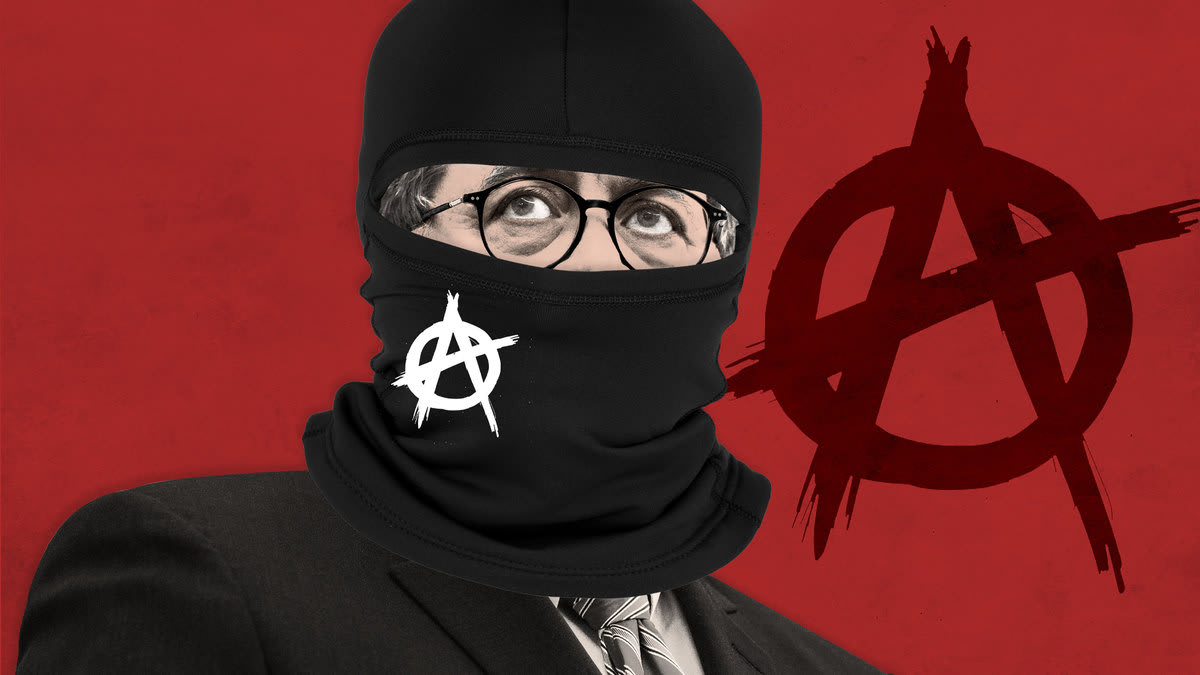For all the implications by President Trump and Attorney General William Barr that “antifa” “terrorists” have hijacked protests against institutional police racism, none of the 22 criminal complaints representing the first wave of protest charges mention antifa in any way.
One case references anarchism as a motivating ideology, not anti-fascism. Another high-profile one in Las Vegas references the so-called “Boogaloo” far-right trend of provoking a race or civil war.
But the early charges do not indicate that antifascist motivations have provoked the violent activity that the Trump administration and its allies have spent the better part of a week attributing to it. With Barr at the helm of the protest response, the administration has tasked the FBI’s counterterrorism partnerships with state and local police, known as Joint Terrorism Task Forces, with finding “extremists” and “agitators” within the protest movement.
“What it definitely demonstrates is that antifascism is not a driving force in the current protest violence,” said Mike German, a retired FBI special agent who worked with the Los Angeles JTTF.
In a press conference on Thursday, Barr continued to claim evidence existed that antifa, which he mistakenly called a “group,” was committing acts of violence at the protests. He was silent about the Boogaloo presence displayed in the early charging documents.
"We have evidence that Antifa and other similar extremist groups, as well as actors of a variety of different political persuasions, have been involved in instigating and participating in the violent activity,” Barr said.
The Justice Department did not immediately respond to a request for comment.
Despite Trump’s rhetoric about designating antifa a terrorist organization, antifa is an ethic rather than an actual group—and even if it were a group, there is no domestic terrorism statute for designating a non-foreign entity as a banned terrorist organization. That’s not stopped a chorus of right-wing voices from fantasizing about state violence against antifascist Americans. “Let's see how tough these Antifa terrorists are when they're facing off with the 101st Airborne Division,” Sen. Tom Cotton (R-Ark.) tweeted. The hashtag #exposeAntifa trended on Thursday.
Yet in briefings to Congress this week about the protests, the FBI has sounded a strikingly different tone, one that echoes the early wave of charges. The FBI did not refer to antifa as a homegrown violent extremist group, according to a knowledgeable congressional staffer.
It matched a senior law enforcement official who told The Daily Beast that the involvement of the JTTFs was “a political ploy to make being anti-Trump look like terrorism.” Similarly, The Nation’s Ken Klippenstein reported that the FBI’s Washington Field Office possessed “no intelligence indicating Antifa involvement/presence” in outbursts of violence at protests in D.C. on Sunday, the day Trump described antifa as terrorists. (In response to Klippenstein’s report, the FBI said, “When written at a local level, these products will note that the perspective offered may be limited to the field office’s area of responsibility.”)
In November 2017 congressional testimony, FBI Director Christopher Wray was asked if the FBI was doing anything to counteract antifa. Wray replied that there were “anarchist extremist investigations” he had open, “we’re not investigating antifa as antifa – that’s an ideology, and we don’t investigate ideologies.”
“When it comes to domestic terrorism, our investigations focus solely on the criminal activity of individual. We are not focused on a particular ideology, we are focused on the violence,” the FBI told the Daily Beast in a statement. “The FBI requires that all domestic terrorism investigations — regardless of specific ideology — be predicated based on activity intended to further a political or social goal, wholly or in part involving force, coercion, or violence, in violation of federal law.”
Of almost two dozen affidavits and depositions federal agents have filed since May 31 to back up criminal charges against individuals allegedly involved in crimes related to anti-racist demonstrations, The Daily Beast found only three that explicitly referenced a political figure or distinct ideology. Of those, one was the trio arrested in Nevada and linked to the Boogaloo movement. An 18-year-old in Worcester, Massachusetts, accused of tossing Molotov cocktails reportedly told local police he was “with the anarchist group.” And a 25-year-old whom authorities claim pointed a semi-automatic automatic weapon at a crowd in Lubbock, Texas also allegedly shouted "this is a revolution" and "Trump must die,” and posted on Facebook about planning to "off racists and MAGA people"—a reference to the president’s supporters.
One of the attorneys charged in Brooklyn with attempting to firebomb an empty NYPD vehicle is a longtime activist, and was arrested wearing a T-shirt with leftist imagery, although the Joint Terrorism Task Force agent assigned to the case did not reference this in his deposition.
Legal advocates like the J. Wells Dixon of the Center for Constitutional Rights said it was a “highly unusual” decision by the local U.S. Attorney’s Office to involve itself in what were effectively incidents of municipal property damage.
“I myself have never heard of a charge like that being brought in federal court,” the senior staff attorney and civil rights advocate said.
That was just one of the cases where the Department of Justice decided to pursue individuals accused of attacking local government facilities. Others included cop cars torched in Salt Lake City, Chicago, and Trenton, New Jersey, a Molotov attack on a county building in Apple Valley, Minnesota, and arson and vandalism at Buffalo City Hall. In each case, the assertion of federal jurisdiction was the same: either that the affected agencies received federal funding, or that they “conduct business in interstate commerce, for instance by purchasing vehicles and other equipment and supplies in interstate commerce.”
Dixon said that these sorts of claims are a “necessary box to check” in order to charge offenders in federal court—and to potentially subject them to much harsher federal sentencing rules.
“Something is happening here,” the attorney said. “Somebody is making a decision to prosecute all of these cases as federal crimes.”
U.S. Attorneys even applied this standard to violations of private property. The Worcester case involved damage to a pharmacy, which a Bureau of Alcohol, Tobacco, Firearms and Explosives agent noted “receives delivery six days a week from a wholesale company, Anda Inc., located in New York.” This, he argued, meant the case impacted interstate commerce and justified federal involvement.
Other prosecutors staked their case on social media. A federal prosecutor in Pennsylvania brought up the accused igniter of a local coffee shop on federal charges on the grounds that the cafe had engaged in interstate commerce by maintaining a website, Facebook account, and Instagram page, as well as ordering cups from New York. And in Atlantic City, a man accused of rioting fell under the Department of Justice’s purview because they designated his cellphone and Facebook account as "a facility of interstate and foreign commerce.” But the agents involved in these cases never alleged any affiliation with a larger group like antifa or other “far-left extremist groups” that Barr claimed last week were behind the outbreak of violence.
In the Nevada case, prosecutors charged three military personnel—one from the Army Reserves, the other the Navy, the third the Air Force—with plotting to destroy a National Parks Service facility and with carrying unregistered Molotov cocktails at a Black Lives Matter event. The feds allege the three are self-identified members of the Boogaloo movement, and plotted to begin their dreamt-of civil war first at Reopen protests, then hurling fire bombs at police to spark violence during the civil rights demonstration. Unlike most of the other indictments, the criminal complaint describes extensive planning and coordination.
German, the retired FBI agent, explained that FBI agents writing the complaints “are normally laser-focused on facts they can prove. Where a fact like the Boogaloo movement exists, that’s explanatory for where a charged individual may have engaged in this conduct.” He described references to the alleged Boogaloo participants as indicating a “tactical methodology” rather than “some description of an ideology.”
Still, German referenced reports that FBI agents in New York were questioning detained protesters about connections to antifa.
“Typically, when we’re talking about antifa, which doesn’t exist as a group in the way the president imagines, it would make it difficult to associate somebody with a group that doesn’t exist as an organization. They’re imagining something that isn’t real. It’ll be hard for an agent focused on facts to list it,” German said.
— with additional reporting by Erin Banco


